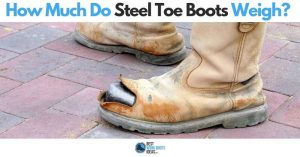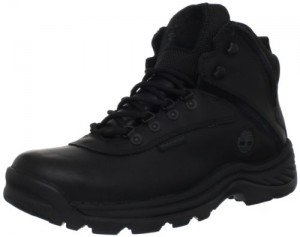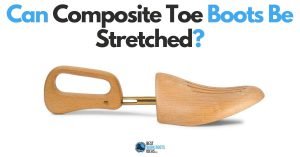Alloy Toe vs Steel Toe vs Composite Toe: Which One Should You Choose?
I have long struggled over the Alloy Toe vs Steel Toe debate. For years, I went back and forth between which toe cap option was the best for me, until I finally did some research and figured out once and for all which worked better.
In this article, I will talk about my journey toward finding the right type of toe cap.
I will also discuss what a toe cap is, and all the different options that are available.
Using this guide, you should be able to make an informed decision on which toe cap may be the best choice for you.
Contents
What Is A Toe Cap
At many job sites or facilities, safety toe caps are required. In fact, at many workplaces, the OSHA requires employees to wear protective footwear so they’re not injured by falling or rolling objects.
Manufacturers of safety footwear test and rate their boots based on an international standard developed by ASTM.
One of the aspects they focus on impact testing, which looks at what happens to a shoe when something heavy falls on it.
They also utilize compression testing, which looks at what happens to a shoe when something heavy rolls over it.
Alloy Toe Cap
Alloy toe caps are a very popular option among workers for several reasons.
One of those reasons is that alloy toe caps are made of a very lightweight material such as Aluminum or Titanium.
These offer the strength of steel at a much lighter weight.
In fact, aluminum is considered some of the toughest metal on earth.
Alloy toed shoes are also generally considered more comfortable than their steel toed counterparts. In fact, they’re usually 30-50% lighter than steel toes, and offer significantly more toe room.
Unfortunately, alloy toe caps are not for everyone. This is especially true if you’re a budget conscious consumer, as they’re generally more expensive than their steel toed counterparts.
Alloy toed shoes also conduct electricity, which might not be appropriate for workers in the electrical field.
They’ve also been known to set off metal detectors, so probably not the best shoe to wear in the airport, either.
If you want to know if you can wear your steel toe boots on a plane then you should read the article we have written on it.
Pros of Alloy Toe Caps:
- Lighter than steel and offers more toe room
- Comfortable, without sacrificing protection
Cons of Alloy Toe Caps:
- Can conduct electricity
- Generally expensive
Steel Toe Cap
Steel toed caps are known for the reliable protecting they provide your feet and toes. In fact, they’re so reliable that they’ve been used in the construction industry for over 80 years.
Since they’ve been used for so long, steel toe caps are the most popular option for toe protection, and they’re also very reasonably priced.
Although steel toed caps are the best protection for your toe, they also feature some pretty hefty cons. Most notably, steel toed shoes are significantly heavier than those with composite or Alloy toes.
Like Alloy toe caps, steel toes can also conduct electricity, making them a risk for anyone working in the electrical field. Additionally, they also set off metal detectors.
This is especially true if you want to wear your steel toe boots on a plane.
Other cons of the steel toed shoe include the fact that they can dent if hit hard enough. And, unfortunately, during cold winter months, steel toe caps can grow quite cold.
Pros of Steel Toe Caps;
- Great protective features
- Reliability that has been used for 80+ years in the field
- Reasonably priced
Cons of Steel Toe Caps:
- Conduct electricity
- Can grow cold or hot in harsh weather
- Dents more easily than steel
You might also be interested in how steel toe boots work here.
Composite Toe
Composite toe caps are otherwise none as non-metallic toe caps, and although they pass all safety standards, they’re generally regarded as the least safe option. That being said, they’re usually made of materials like kevlar, carbon fiber, fiberglass, or plastic.
Although they’re not considered as safe as Steel toe or Alloy toe caps, composite toe caps are quickly rising in popularity because of their superior comfort and lightweight design.
Unlike the metal based toes, composite toe caps can be worn in cold or hot temperatures without getting extra hot or cold. Plus, they’re also wearable through metal detectors!
Typically, composite toes have to be replaced more often than Steel or Alloy toes, because they’re more prone to compression through impact. Additionally, composite toes are usually the most bulky option, and many who wear them complain about a lack of toe room.
If you’re interested in comparing composite toe vs steel toe, then read the article.
The pros of the composite toe include:
- Can be worn through metal detectors/doesn’t conduct electricity
- Don’t get hot/cold easily
The cons of Composite Toe include:
- Not as sturdy as steel or alloy
- Often times clunky/bulky
Soft Toe
Soft toe shoes, otherwise known as non-protective toe boots, offer no toe protection from falling or rolling objects. Because of this, they’re usually not suited for dangerous work environments, such as construction or industrial based settings.
Although they don’t offer much protection, soft toe boots do have some benefits. Generally, they’re preferred by individuals who don’t like the discomfort and heavy feeling of the other boots.
Soft toe boots also offer more foot flexibility!
Safety Standards and Compliance – Impact & Compression
In order to be fit for use in a dangerous work environment, safety footwear (including toe caps), they must meet a minimum criteria.
In the United States, there are several standards that they have to meet which cover Impact and Compression. These include an ASTM F2413 standard, OSHA and an ANSI standard.
The American Society for Testing and Materials (ASTM) standard measures impact and compression resistance. In this test, 50 pounds weights are dropped from 1.5 feet .
If the toe cap compresses more than .5 inches, it doesn’t meet the ASTM standard.
The Occupational Safety and Health Administration (OSHA) standard states that safety-toe footwear must have a leather upper, oil resistant, non-ski soles, and have an impact resistance rating of 75.
Finally, the American National Standard Institute (ANSI) has a footwear safety standard as well. Theirs states that all footwear must have a protective toe and offer both impact and compression protection.
Clearly, with all the regulations out there, foot wear can’t get much safer for those working in a potentially dangerous environment.
How To Choose The Right Toe Type For You
When considering the purchase of a new toe cap or toed shoe, the first thing you’ll want to consider are your Personal Protective Equipment (PPE) Requirements. Generally, these can be found in your work contract or on same employer’s websites.
Other questions you’ll want to ask yourself:
- What level of protection do you need?
- What type of job am I doing?
- What aspects of the shoe are most important to me
More often than not, you’ll want to utilize a safety first approach, and consider which shoes have the best protective ability, rather than what looks the best.
If you’re going to be standing on your feet all day, you might want to consider a lighter weight option, like an Alloy or composite toe rather than a steel toe!
On the other hand, if you’re working with heavy equipment all day, it’s probably better to go for a more protective steel toe than a light-weight feel.
Next, you’ll have to develop some preferences. If comfort is an important aspect of any shoe you purchase, you’ll want to make sure that you choose a comfortable option.
Likewise, you’ll probably want to choose a toe box that offers enough wiggle room to remain comfortable.
The metal toe caps can sometimes get hot during the summer months, and cold during the winter months.
That said, if that’s something that would frustrate you, you’ll want to consider the composite option.
If price is a large concern for you, steel toe caps are generally considered the most reasonably priced.
Composite toe caps, which are also reasonably priced, have to be replaced more often than others, meaning you’ll probably end up paying more.
Work Boot Brands
There are really great options for whatever type of toed boot you’re considering. As long as you keep your preferences in mind, you should be able to find an option that works well for you.
Steel Toed Work Boot Brands
One of the most reputable steel toed options is are from White’s. In fact, boots from White’s like the Workman or the Smoke Jumper are fantastic books that also look great.
That being said, since they are from a premium work brand, they will be quite costly. If you’re looking for work boots on a budget, there are many options to choose from..
Other great steel toed products include boots in the KEEN utility collection, and other options from Wesco or Danner.
In fact, all safety shoes manufactured by Danner have electrical shock resistant soles and heels that will help make sure you don’t get shocked in the workplace!
Alloy Toed Work Boot Brands
KEEN also offers a wide variety of Alloy toed boots that look great, and are priced very reasonably! KEEN’s Alloy work boots are also waterproof, and offer a great mixture of protection and comfort.
Timberland also offers several Alloy toed work boots. If you’re looking for a stylish, brand-name alloy toed boot, definitely give these a shot.
Composite Toed Work Boot Brands
If you’re looking for a composite toe work boot, you’ll once again want to check out the Danner brand.
Both the Danner Super Rainforest and the Danner Striker NMT are great composite toe boots and very well-built.
If you’re looking for a boot that’s a little more reasonably priced, you can also check out the Bate’s GX-8!
FAQs
No, Alloy toe and Steel toe are not the same. While they are both metallic options for a toe cap, they both have different pros and cons.
For example, steel toed shoes are often heavier than Alloy toed, but they can also provide more protection.
The answer to this question is, honestly, it depends on what you’re looking for. As mentioned above, both shoes have different pros and cons, and depending on what type of job you’re doing, and your specific preferences, either one could be a fantastic fit.
Summary and Wrap Up of Alloy Toe vs Steel Toe vs Composite Toe Types
Clearly, there is no shortage of options when it comes to good toe caps and toed work boots. That being said, you should always consult your PPE guidelines, or your HR team, before purchasing any product that can affect your safety in the workplace.
Upon purchasing, make sure your shoe adheres to ASTM standards, and ensure that you’re purchasing from a reputable brand. It goes without saying that if you’re working with electricity, make sure your toe cap doesn’t conduct electricity.
Keep all this in mind and you should find a product to keep you safe and comfortable in the workplace for many years to come.
Hopefully now you know the difference between Alloy Toe vs Steel Toe vs Composite Toe caps.






![Carbon Toe vs Composite Toe [featured image]](https://www.bestworkbootsideas.com/wp-content/uploads/2022/05/carbon-toe-vs-composite-toe-featured-image-300x157.jpg)